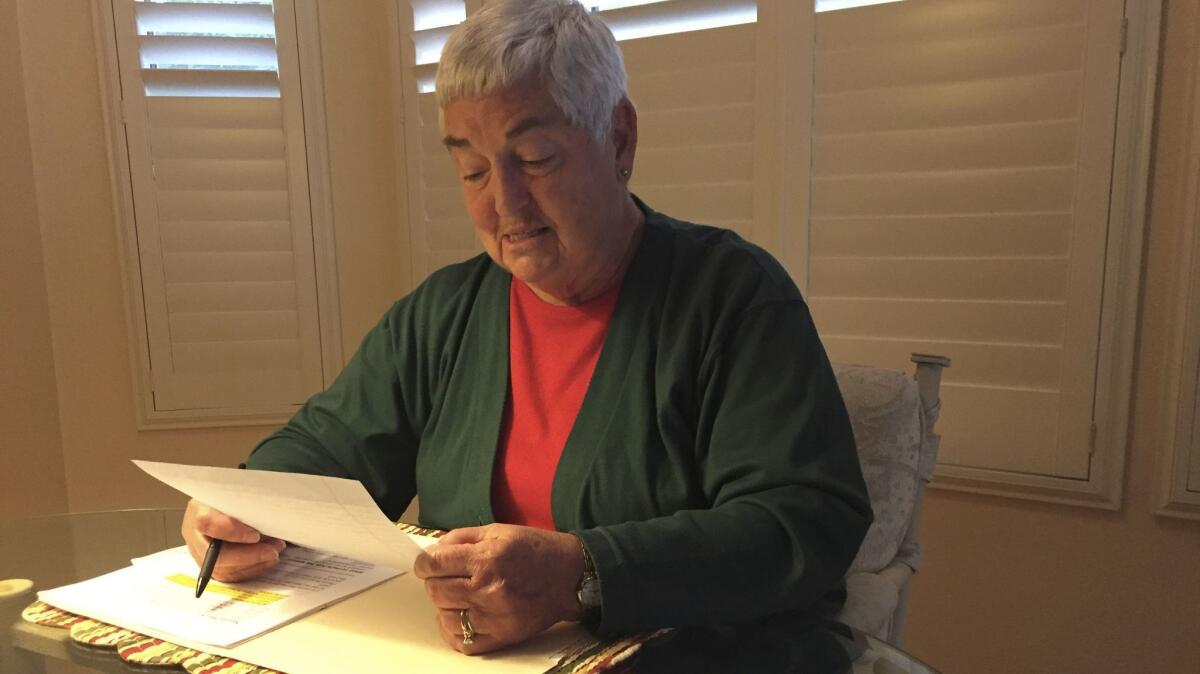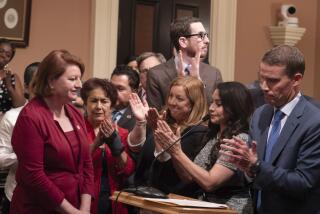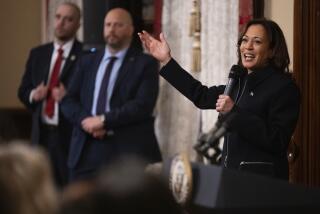‘What if women...?’ Thousands prepare to answer with a march on Washington

At the age of 74, Sue Fernandez has lived through the civil rights movement, the Vietnam War and the invasion of Iraq without joining a single protest. She was busy raising three sons and working full time as a pharmaceutical researcher. She took some pride in staying out of politics.
That was before the 2016 presidential election, a campaign that might have ushered in America’s first woman president, but did not.
This week, Fernandez boarded a plane for the East Coast, making her way to Washington, D.C. There, she will join an estimated 200,0000 others Saturday for the Women’s March on Washington — a massive display of female political will scheduled to unfold on the streets of the nation’s capital the day after Donald Trump is inaugurated as the nation’s 45th president.
“This is the first time I felt compelled,” said Fernandez, sitting at her kitchen table in a golf course retirement community on the outskirts of Phoenix, methodically reviewing a handwritten list of supplies (granola bars, clear plastic tote, subway card). “This thing has become so much bigger than any of us alone.”
At first, Fernandez hadn’t been too fussed about the presidential election. But then she thought of all her ailing older friends and how dependent for their care they all are on immigrants from Latin America — some possibly targeted for deportation under Trump’s administration. She thought about her daughter-in-law, an African American attorney, and her biracial grandchildren, all of whom worry about Trump’s commitment to civil rights.
The Washington march and simultaneous demonstrations across in the country are taking shape as one of the largest mass demonstrations in recent U.S. history, rivaling the civil unrest that swirled around the Vietnam War.
While it’s not expected to be as large as the Million Man March against racism in 1995 or the Million Woman March two years later in in Philadelphia, the event could wind up being a bigger draw than Trump: 1,200 bus parking spaces have been reserved, three times as many as for the inauguration Friday.
The march embraces a grab bag of progressive causes, its website listing more than 300 partners promoting causes including anti-bullying, gun control, climate change and transgender rights.
And it’s not only women. Men from across the country will be part of the demonstrations. Two of Fernandez’s three sons are participating in marches, while the third is staying home so his wife can march.
The fact that so many diverse groups have joined has already sparked some tension.
Organizers have wrestled with conflicting agendas of race and sexual orientation. African American women initially questioned whether they would be adequately represented, leading some more conservative white women to question whether they would be welcomed. A group of antiabortion feminists was disinvited as a full-fledged partner.
Fernandez, who describes herself as an “ostrich” politically, has seen the polarization of American society show up even in her retirement community. One woman in her social circle dropped her as a tennis partner after learning that she voted for Hillary Clinton.
“I sit with these women in church. I just want to say, I still like you. I still want to play tennis with you,” said Fernandez, who will march with family members including her 7-year-old granddaughter. “I’m not an angry person. I don’t like confrontation. I don’t see the march as anti-Trump. But it is important for us to get out there and support the freedoms that we have worked so hard for. If not for my generation, than the next.”
Linda Whittlesey, 60, a massage therapist and jewelry designer, is undertaking an eight-hour drive, then a flight and a bus to get to Washington from the outskirts of Missoula, Mont.
“I’ve never been to a march in my life, but I figured, if not now then when?” she said. “We often have these ideas of we should have, we wish we had, we ought to have.… We all now just better do whatever we can.”
Living in Montana, which she calls “a little slice of paradise where I’m secure in my bubble,” Whittlesey has been increasingly looking outside herself at the threats she believes are facing her country. In her litany of worries, she lists climate change and the threatened demise of the Affordable Care Act. She worries that someone could start a new war.
“These are not, strictly speaking, women’s issues, but I can’t separate women’s issues from human issues,” Whittlesey said.
Exactly what is drawing all these women — and many men — to make the often long and costly pilgrimage to Washington is often very individual.
For some women, the gathering is an elegy to the dream of electing a female president. Others see it as an affirmation of the progressive causes championed by Sen. Bernie Sanders of Vermont, who unsuccessfully sought the Democratic nomination.
“Women are marching for each other,” said co-organizer Winnie Wong, a 40-year-old digital strategist credited with creating the hashtag #feelthebern for Sanders. Wong said she is concerned not for herself or her colleagues, but for lower-income women. “We never talk about the women who work at Wal-Mart, who work in every service center, the ones who are raising their children,” she said. “We have to help lift them up.”
For some, the voyage to Washington is deeply personal.
Driving cross-country from Long Beach to Washington in a rented red Ford Focus, Nicolassa Galvez said she was motivated by her experience of being sexually molested as a child by a family friend.
“Having basically the president of the United States not held accountable [for his behavior with women] was kind of a personal slap in the face, and just made me worry for my own safety and the safety of other women, because I think people will look up to him,” Galvez said. “It gives permission.”
Some marchers are striving to keep the spotlight on opportunity and potential, rather than on grievances. Lauren Hagler, a 24-year-old African American who is pursuing her doctorate In chemistry at the University of Illinois, says she hopes to be an inspiration for younger women who aspire to a career in science.
“When I was deciding to pursue my doctorate, I wanted to be someone who the next generation of African American girls can look to,” she said.
Among the delegations is a Dallas-based group of antiabortion feminists. Their organization, New Wave Feminists, was removed as an official partner of the march, which includes support for legal abortion as part of its mission statement. But the women intend to march in Washington anyway.
“I’m hoping we will be received well. I personally have more pro-choice friends than pro-life,” said 33-year-old Destiny Herndon-De La Rosa, the head of the group, who gave birth to her first son while in high school.
She says she was motivated to join the march by her opposition to Trump.
“He might claim to to be pro-life, but to me the death penalty is not pro-life, war is not pro-life, the way he wants to treat refugees is not pro-life,” said Herndon-De La Rosa, who conceded that some women in her delegation were probably Trump voters — which will make them a rarity at Saturday’s march.
March organizers say they have struggled to be as inclusive as possible without diluting their message.
“Rather than focusing on ‘We’re anti-Trump,’” said Susan Schnall, 73, a former military nurse and veteran antiwar activist, “what we’re trying to do is say that this is what we stand for.”
Demick reported from New York and Goodyear and King from Washington. Times staff writer Seema Mehta contributed from Los Angeles.
ALSO
Analysis: Donald Trump’s transition has hurt his popularity, not helped
More to Read
Start your day right
Sign up for Essential California for news, features and recommendations from the L.A. Times and beyond in your inbox six days a week.
You may occasionally receive promotional content from the Los Angeles Times.






